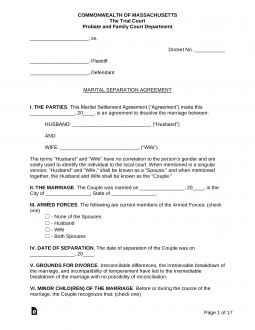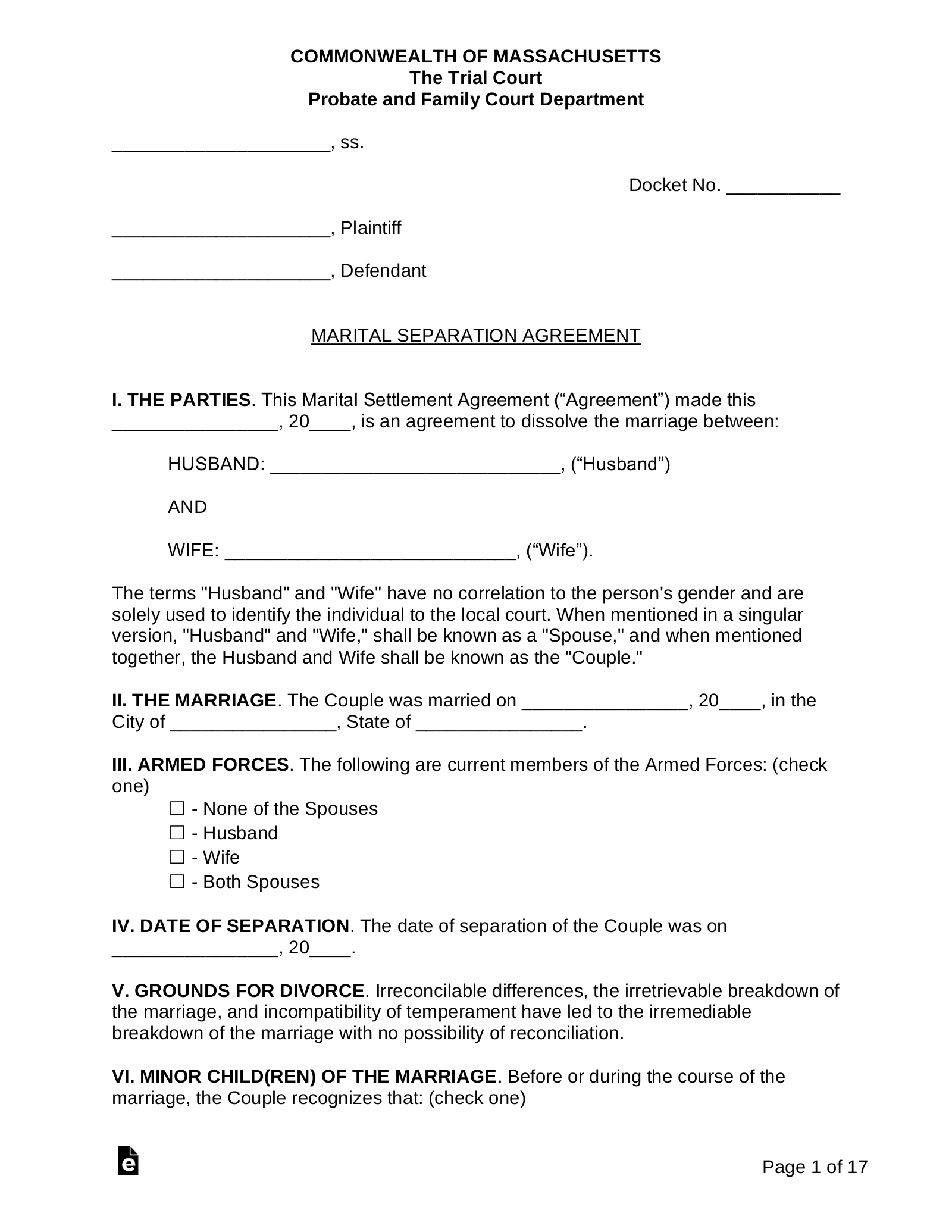Updated February 08, 2024
A Massachusetts marital settlement agreement, which is legally termed as a “marital separation agreement,” allows two (2) divorcing spouses to enter into an arrangement regarding the terms of their divorce and is often drafted with the assistance of professional attorneys. The document covers the division of property, assets, liabilities, child custody, and if applicable, the assignment of alimony and child support. If the couple wishes to file an uncontested “no-fault” divorce (a divorce in which neither spouse is accused of committing a fault) they must complete, notarize, and file a separation agreement along with their petition for divorce. Even in a fault-based divorce, couples are required to execute a separation agreement before a final hearing will be set.
Table of Contents |
Divorce Laws
Statutes – General Laws, Part 2, Title 3, Chapter 208 (Divorce)
Alimony (208 § 34, § 49, and § 53) – When awarding alimony to one (1) of the spouses, the court will determine the nature and amount of support payments in consideration of the following:
- The length of the marriage
- The age and health of each party
- The income, employability, and earning potential of each party
- Each spouse’s financial contributions to the marriage
- The assets and liabilities of each party
Alimony Calculator – Infinity Law Group, Amherst Divorce, Skylark Law, Lynch & Owens
Child Support (208 § 28) – The court will award child support (maintenance) to one (1) of the parents in consideration of the best interests of the child, each parent’s adjusted income, which parent is the primary caregiver, and weekly expenses associated the health insurance, child care, and medical needs of the child.
Child Support Calculator – Amherst Divorce, Skylark Law, Farias Family Law
Division of Property (208 § 34) – Commonwealth law allows all of a divorcing couple’s property to be divided by the court in a manner that the judge considers fair (known as equitable distribution). The following factors will be considered in the determination of how marital property will be divided:
- The length of the marriage
- The conduct of each party during the marriage
- The age and health of each party
- The station, occupation, and income of each party
- The employability and earning potential of each party
- The assets and liabilities of each party
- The needs of any children from the marriage
- Each party’s contribution to the acquisition, maintenance, and value appreciation of real estate
Grounds for Divorce (208 § 1, § 1A, § 1B, § 2, and § 22) – The grounds for divorce in Massachusetts are as follows:
- Adultery
- Impotency
- Desertion of one (1) year
- Excessive use of alcohol and/or drugs
- Cruel and abusive treatment
- Refusing to provide support and maintenance
- Irretrievable breakdown of the marriage
Interim Support (208 § 17 and § 28A) – The court can award temporary alimony and child support to one (1) party while a divorce action is still pending.
Residency (208 § 4 and § 5) – For couples to get divorced in Massachusetts, they must meet one (1) of the following requirements:
- The petitioner lived in Massachusetts for at least one (1) year
- The couple lived in Massachusetts as a married couple and the cause for separation occurred there
The couple has lived in Massachusetts as a married couple and one spouse lived in the commonwealth when the cause for separation occurred in another jurisdiction
Divorce Forms
- Where to File – Probate and Family Court in County of Residence
- Filing Fee – $215
- How Long Does it Take? At least ninety (90) days
Some PDFs must be downloaded from the linked file in order to be viewed.
Uncontested Divorce with No Children:
- Joint Petition for Divorce (CJD-101A) (Instructions)
- Divorce or Annulment, Certification Vital Statistics (R-408)
- Affidavit of Irretrievable Breakdown
- Marital Separation Agreement
- Record of Absolute Divorce (R-408)
- Financial Statement Short Form / Long Form / Schedule A / Schedule B
- Notice of Assignment (sent by court’s office)
- Motion Requesting a Waiver of Attendance (obtained from court’s office)
- Waiver of Attendance (obtained from court’s office)
- Judgment of Divorce and Divorce Decree (obtained from court’s office)
- Request for Copies
Uncontested Divorce With Children:
-
- Joint Petition for Divorce (CJD-101A) (Instructions)
- Divorce or Annulment, Certification Vital Statistics (R-408)
- Affidavit of Irretrievable Breakdown
- Marital Separation Agreement
- Record of Absolute Divorce (R-408)
- Financial Statement Short Form / Long Form / Schedule A / Schedule B
- Child Support Guidelines Worksheet (CC-DR-035)
- Affidavit Disclosing Care or Custody Proceeding (OCAJ-1 TRC IV)
- Motion to Waive Attendance at Parent Education Program (CJD-444)
- Parent Education Certificate (given upon program completion)
- Notice of Assignment (sent by court’s office)
- Motion Requesting a Waiver of Attendance (obtained from court’s office)
- Waiver of Attendance (obtained from court’s office)
- Judgment of Divorce and Divorce Decree (obtained from court’s office)
- Request for Copies
How to File for Divorce in Massachusetts (9 steps)
- Complete Divorce Paperwork
- Financial Statement
- File Divorce Papers and Marriage Certificate with Local Probate and Family Court
- Affidavit Disclosing Care/Custody Proceeding (With Children Only)
- Parent Education Program (With Children Only)
- File Affidavit and Other Paperwork (With Children Only)
- Notice of Assignment
- Attend Hearing and Divorce Decree
- Name Change
1. Complete Divorce Paperwork

To file for an uncontested divorce, couples in Massachusetts can file a Joint Petition for Divorce in which both parties are named as petitioners and neither as the defendant. The grounds for the divorce must be declared as an “irretrievable breakdown of the marriage,” and the couple will need to enter into a Marital Separation Agreement.
The following paperwork must be completed by both parties:
- Joint Petition for Divorce (both parties sign)
- Affidavit of Irretrievable Breakdown (both parties sign)
- Divorce or Annulment, Certification Vital Statistics (no signature required)
- Marital Separation Agreement (must be signed by both parties and notarized)
- Record of Absolute Divorce (no signature required; date of and number of judgment and cause at the time the divorce becomes final
2. Financial Statement
Each party is also required to complete a Financial Statement Short Form (for individuals with an annual income of $75,000 or less) or Financial Statement Long Form (for individuals with an annual income that is over $75,000) and have it signed by a notary public. Spouses who are self-employed will also need to complete and attach a Schedule A form, and if they receive an income from rental property, Schedule B.
3. File Divorce Papers and Marriage Certificate with Local Probate and Family Court
Once all of the required divorce paperwork has been completed, one (1) member of the couple will need to be file the completed documents, along with a certified copy of their marriage certificate, with the clerk of the Probate and Family Court for the county in which at least one (1) of the spouses resides. The clerk will charge a $215 filing fee which can be waived if the petitioner files an Affidavit of Indigency and qualifies.
4. Affidavit Disclosing Care/Custody Proceeding (With Children Only)
If the couple has any children, they will each need to complete an Affidavit Disclosing Care or Custody Proceeding and deliver it to their spouse. If either party wishes to seek child support in the case, they must also complete the Child Support Guidelines Worksheet.
5. Parent Education Program (With Children Only)

Within thirty (30) days from the date the petition was filed, the parents will be required to register for and attend a parent education program. If either parent wishes to, they can apply to waive the training requirement by completing and filing a Motion to Waive Attendance at Parent Education Program. Upon completion of the parental training, the petitioners will receive a Parent Education Certificate.
6. File Affidavit and Other Paperwork (With Children Only)
After completing the parental education requirement, both parents will need to return to the court to file the Affidavit Disclosing Care or Custody Proceeding, Child Support Guidelines Worksheet (if applicable), and Parent Education Certificate with the court clerk.
7. Notice of Assignment
The clerk will set a hearing date within thirty (30) days from the date that all of the required paperwork was received and deliver Notices of Assignment to the couple. To request the court to waive the attendance requirement, either spouse may file a Motion Requesting a Waiver of Attendance.
8. Attend Hearing and Divorce Decree

Both parties must attend the hearing (unless a Waiver of Attendance was granted), where the judge will review their divorce papers and may ask questions of either spouse regarding their petition and affidavit. The couple will need to prove that there has been an irretrievable breakdown of their marriage. If the judge determines the grounds to be justified and the Marital Separation Agreement to be fair, they will enter a Judgment of Divorce. One-hundred twenty (120) days after the judgment date, the divorce will be final and each party will be able to file a Request for Copies to obtain certified copies of the decree.
9. Name Change
Either spouse can revert to their former surname by including a request to restore their previous name in their petition for divorce. Once the divorce is finalized, the name change will be included in the divorce decree. To restore their name after divorce or to legally adopt a new name, individuals will need to file a separate Petition to Change Name of Adult with their local Probate Court.


